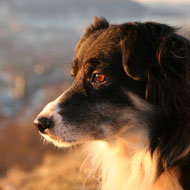New DNA test for goniodysgenesis

Dogs at greatest risk of developing Primary Closed Angle Glaucoma have severe goniodysgensis.
A new DNA test for severe goniodysgenesis and glaucoma in border collies has been approved by the Kennel Club.
Primary glaucoma is a painful and blinding condition associated with high pressure inside the eye.
Primary Angle Closure Glaucoma (PACG) or Primary Closed Angle Glaucoma (PCAG) is linked to the defective development of the drainage angle, termed goniodysgensis. Dogs at greatest risk of developing PCAG have severe goniodysgensis.
In a press release, the Kennel Club said the new DNA test is a ‘candidate gene mutation’ test which differs from the DNA tests previously recorded.
“Whilst most DNA tests identify the actual mutation at a specific gene that is definitively shown to cause the disease, sometimes determining this can be difficult,” it said.
“In this case, the mutation identified is strongly associated with severe goniodysgenesis. However, although this association means it is very likely that the identified mutation is the cause of this disorder, it is not absolutely proven, and so is described as a ‘strong candidate’.
“A ‘candidate gene mutation’ test may nevertheless have considerable value in assisting breeding dogs free from the disease, while not being completely definitive.”
The Kennel Club adds that health conditions which have a candidate gene test are likely still be autosomal dominant or autosomal recessive and the breeding advice will remain the same.
Because of the lack of definitive proof that the candidate gene is the cause of disease, however, the Kennel Club cannot assign progeny as ‘hereditary clear’. As such, results will only be recorded for individual dogs.



 The Veterinary Medicines Directorate (VMD) is inviting applications from veterinary students to attend a one-week extramural studies (EMS) placement in July 2026.
The Veterinary Medicines Directorate (VMD) is inviting applications from veterinary students to attend a one-week extramural studies (EMS) placement in July 2026.